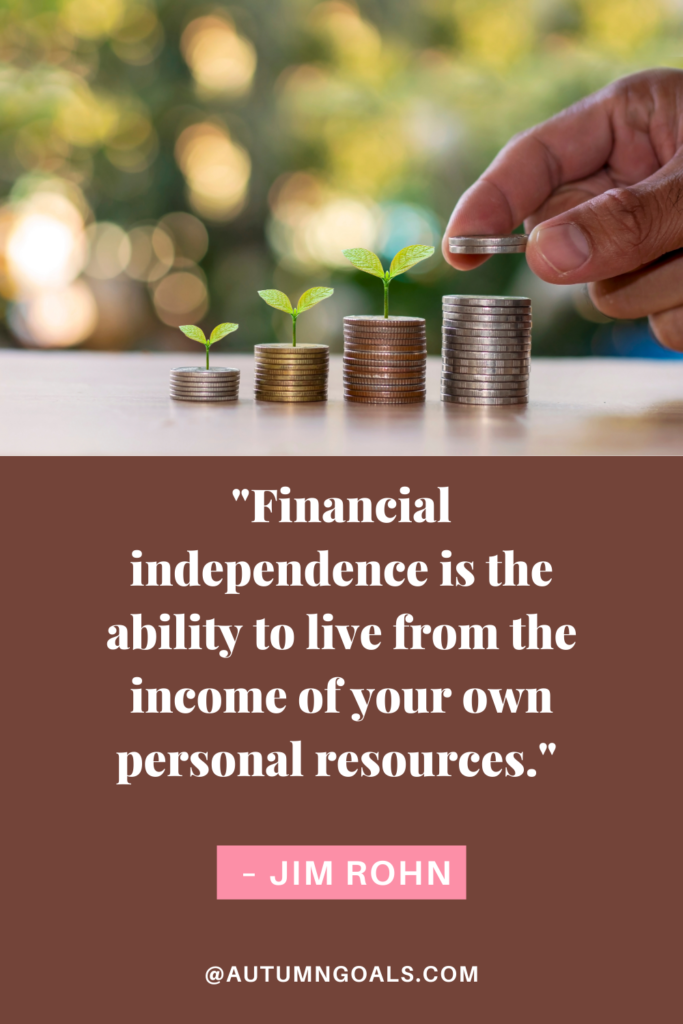Mastering Financial Well-being – A Key to Personal Development
March 4, 2024 | by autumngoals.com

Photo by micheile henderson on Unsplash
Welcome to the journey of personal development, where we explore the seven key areas that make up the Wheel of Life. Today, we embark on a crucial aspect of our lives – Financial Well-being. Financial Well-being is one of the 7 Areas of the Wheel of Life. Picture this: You’re standing at the centre of a thriving life, and one of the spokes that supports and propels you forward is your financial stability and independence. It’s not just about money; it’s about unlocking doors to your dreams, reducing stress, and creating a secure future.
Financial Well-being is an essential pillar of personal development. It’s not merely about accumulating wealth; it’s about mastering the art of financial management to enhance the quality of your life. In this article, we’ll dive deep into the world of Financial Well-being, exploring how developing good financial habits can create a solid foundation for your future. Along the way, we’ll provide expert insights, actionable advice, and inspiring quotes to guide your journey to financial success.
Financial Stability: The Cornerstone of Well-being
Financial stability is the bedrock upon which your dreams and aspirations are built. It’s about having the financial means to cover your basic needs and then some. Imagine a life where you can comfortably pay your bills, handle emergencies without stress, and have the freedom to pursue your passions. That’s the power of financial stability.
Developing Good Financial Habits
- Budgeting: Budgeting is like a map for your money. It helps you track your income and expenses, ensuring you don’t overspend or waste money on things that don’t align with your goals. Create a monthly budget that allocates funds for essentials, savings, and discretionary spending.
- Emergency Fund: Building an emergency fund is a smart move. Aim to save at least three to six months’ worth of living expenses. This financial cushion can ease stress during unexpected events like medical emergencies or job loss.
Benefits of Financial Stability
- Reduced Stress: Financial stability reduces anxiety and stress associated with money problems. It allows you to focus on personal growth and well-being instead of worrying about how to make ends meet.
- Peace of Mind: Knowing you have a financial safety net provides peace of mind. You can face life’s uncertainties with confidence, knowing you have the resources to handle them.
- Freedom to Pursue Dreams: Financial stability empowers you to pursue your passions and dreams, whether it’s traveling, starting a business, or furthering your education.

Financial Independence: Empowering Your Future
Financial independence is the goal that many aspire to achieve. It means having the freedom to live life on your terms, without being shackled to a 9-to-5 job just to make ends meet. Achieving financial independence requires discipline, planning, and wise investments.
Developing Good Financial Habits
- Investing Wisely: Learning to invest your money wisely can accelerate your journey to financial independence. Consider diversified investment options, such as stocks, bonds, real estate, and mutual funds. Consult with a financial advisor if needed.
- Continuous Learning: Stay updated about personal finance and investment trends. Attend seminars, read books, and follow financial experts to expand your knowledge.
Benefits of Financial Independence
- Time Freedom: Achieving financial independence means you can choose how to spend your time. You can focus on activities that bring you joy and fulfillment rather than just earning a paycheck.
- Generational Wealth: By building wealth, you can leave a legacy for future generations, ensuring your family’s financial well-being for years to come.
- Lifestyle Choices: Financial independence allows you to make lifestyle choices based on your values, not financial constraints. You can live where you want, travel when you want, and retire when it suits you.

Good Financial Habits: The Building Blocks of Success
Now that we’ve covered the pillars of financial well-being, let’s delve deeper into the habits and behaviors that can help you achieve your financial goals.
1. Smart Goal Setting
Setting clear, achievable financial goals is essential. Whether it’s saving for a down payment on a house, paying off debt, or retiring comfortably, having well-defined goals gives you direction and motivation.
2. Regular Saving
Make saving a non-negotiable habit. Automate your savings by setting up automatic transfers to your savings or investment accounts. Pay yourself first, and you’ll be surprised how quickly your savings grow.
3. Debt Management
Manage your debt wisely. Focus on paying off high-interest debts like credit card balances. Avoid accumulating unnecessary debt and only take on loans for investments that will appreciate over time.
4. Financial Education
Continuously educate yourself about personal finance and investment strategies. Attend workshops, read books, and seek advice from experts to make informed decisions.
5. Emergency Fund
As mentioned earlier, having an emergency fund is crucial. Start by saving a small portion of your income each month until you reach your target. Most financial advisors suggest that 6 months’ worth of your monthly expenses is a good Emergency fund.
6. Diversified Investments
Diversify your investments to spread risk. Don’t put all your money into one asset class. A mix of stocks, bonds, real estate, and other investments can provide a balanced portfolio.
7. Mindful Spending
Practice mindful spending by distinguishing between needs and wants. Before making a purchase, ask yourself if it aligns with your financial goals and values.
8. Track Your Expenses
Regularly monitor your spending to ensure it aligns with your budget. Use apps or spreadsheets to track every dollar you spend.
9. Seek Professional Advice
Don’t hesitate to consult a financial advisor for personalized guidance. They can help you create a financial plan tailored to your goals and risk tolerance.
10. Review and Adjust
Periodically review your financial plan and adjust it as needed. Life circumstances change, and your financial goals may evolve over time.
The Power of Financial Well-being
In the journey of personal development, don’t underestimate the pivotal role that Financial Well-being plays. It’s not just about amassing wealth; it’s about creating a life of security, freedom, and fulfilment. By developing good financial habits, such as budgeting, saving, and investing wisely, you pave the way for a brighter future.
Remember the words of Warren Buffett, one of the world’s most successful investors: “Do not save what is left after spending, but spend what is left after saving.” These words encapsulate the essence of financial well-being. Prioritize saving and investing for your future, and you’ll find that the stress of financial uncertainty gradually fades away.
So, as you continue your personal development journey, keep Financial Well-being in your sights. By building a strong financial foundation, you’re not just securing your own future but also creating opportunities to make a positive impact on the world. As you master the art of financial management, you unlock the doors to your dreams and pave the way for a life of abundance, fulfilment, and personal growth.

You may also be interested in this post about the 7 Areas of the Wheel of Life
RELATED POSTS
View all



